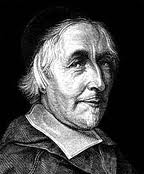 In his biography of Vincent de Paul, Louis Abelly introduced a number of hagiographic myths that continue to haunt Vincentian studies. For example, Abelly took a conference in which Vincent had related the story of someone he knew who was once falsely accused of theft, and applied it to the saint himself. Abelly says that the truth of this incident “became known only after his (Vincent’s death), through the testimony of Monsieur de Saint Martin, canon of Dax…” According to Abelly’s account (found in Chapter five of his biography), the judge from Sore who had been incensed by Vincent’s denial of the theft: “knew that Monsieur Vincent was in the habit of consulting Father [Pierre] de Berulle….The judge took the occasion one day to find Monsieur Vincent in Father de Berulle’s company, together with several other distinguised guests. He publicly berated Monsieur Vincent, calling him a thief and formally serving a writ upon him, requiring him under threat of excommunication to testify before an ecclesiastical court. The man of God showed no resentment at this affront, took no great pains to justify himself, but said calmly ‘God knows the truth.'” In his biography Pierre Coste, C.M., largely repeats Abelly’s account and interpretation with only minor changes.
In his biography of Vincent de Paul, Louis Abelly introduced a number of hagiographic myths that continue to haunt Vincentian studies. For example, Abelly took a conference in which Vincent had related the story of someone he knew who was once falsely accused of theft, and applied it to the saint himself. Abelly says that the truth of this incident “became known only after his (Vincent’s death), through the testimony of Monsieur de Saint Martin, canon of Dax…” According to Abelly’s account (found in Chapter five of his biography), the judge from Sore who had been incensed by Vincent’s denial of the theft: “knew that Monsieur Vincent was in the habit of consulting Father [Pierre] de Berulle….The judge took the occasion one day to find Monsieur Vincent in Father de Berulle’s company, together with several other distinguised guests. He publicly berated Monsieur Vincent, calling him a thief and formally serving a writ upon him, requiring him under threat of excommunication to testify before an ecclesiastical court. The man of God showed no resentment at this affront, took no great pains to justify himself, but said calmly ‘God knows the truth.'” In his biography Pierre Coste, C.M., largely repeats Abelly’s account and interpretation with only minor changes.
Contrast the above story with this fact: On April 17, 1628 Vincent de Paul gave sworn testimony in the beatification process of Francis de Sales. As he began his testimony Vincent said: “I know that perjury in all cases, but especially in those of canonizations such as this one, is a very serious mortal sin, which, by the grace of God, I never want to commit.” A few statements later Vincent says: “Never, by the grace of God, have I been accused of any crimes, nor been investigated, nor brought before any judge; nor have I, by name been denounced publicly or excommunicated.” (Coste, CCD, Volume 13b, 80-81).
This evidence again points to the ongoing importance of the careful deconstruction of Abelly’s enduring myths to uncover the Vincent of history.